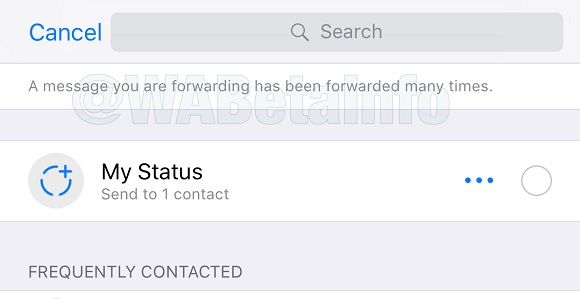
In addition to testing the ability to cross-post your Instagram Stories to WhatsApp, the WhatsApp team is working on other potential enhancements such as a new spam-detection system designed to help warn users about suspected hoax messages.
A spokesperson said the company is watching spam closely: “We feel that we have a good handle on things so that we can keep it under control.” WABetaInfo reports they’re now testing enhanced spam-prevention features with a subset of users ahead of a wider rollout.
If the system detects a hoax message and an unsuspecting user attempts to forward it, they’ll be now shown a cautionary notice that the message “has been forwarded many times.”
The app is limiting the number of messages that can be forward at once to 30 (for more than that, you should use the Broadcast List feature). Users will also be allowed to forward a single message up to 25 times before seeing the alert.
The notice also appears on recipients’ devices for any messages that have been forwarded more than 30 times. While WhatsApp won’t block repeat offenders, the hope here is that people who receive a potential message that has been forwarded one too many times will be encouraged to report the sender, helping improve the spam-detection system further.

WhatsApp is going to cost us money soon. The only way that it will stay free is if you are a frequent user i.e. you have at least 10 people you are chatting with. To become a frequent user send this message to 10 people who receive it (2 ticks) and your WhatsApp logo should turn red to indicate a frequent user.
Joining WhatsApp’s existing spam-reporting tool, this new spam-detection system looks for various signals that may identify a spammer, like Internet provider, phone number, carrier network, where the traffic is coming from and so forth.
Should the system detect that a user is messaging people through the same Internet provider or carrier network over and over again, it will raise red flags. The same thing happens when other unusual patterns have been detected, like using WhatsApp with a US phone number via a network in Nigeria and connecting five minutes later through a Chinese carrier.
If a user is erroneously identified as a spammer, they can request that WhatsApp lift the ban.
Anything the company can do to help limit the spread of those ridiculous chain letter-style spam messages via WhatsApp gets a big thumbs-up in my book!
On an unrelated note, WhatsApp announced all-new business accounts which give brands and small businesses a way to let their customers connect with them via chat.